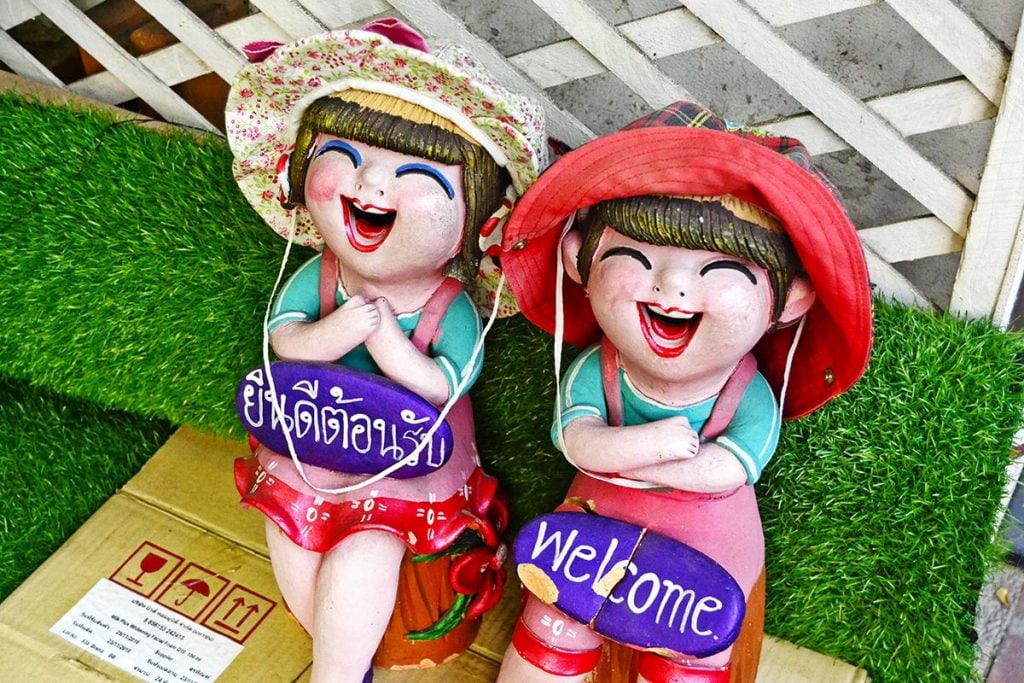Top 10 Phrases to Learn Before Your Trip to Thailand
Whilst many bars, restaurants, accommodations, and attractions will have English speaking staff in the major tourist areas, you may run into problems in more off the beaten track and rural destinations in Thailand if you cannot speak a little bit of the local language.
Some key points to remember are that if you are male you refer to yourself as pomme, and if you are female you are chan. Thais also add a gender-specific suffix to the end of sentences to be polite. Whilst this does not change the meaning of the sentence, it is conventional and shows good manners. Males add krap and females add ka. These are not typically added, however, at the end of many questions.

Table of Contents
- 1. Sawadee krap/ka: Hello
- 2. Kap khun krap/ka: Thank You
- 3. Chai/Mai chai/Mai ow: Yes/No/No thanks
- 4. Hong nahm you tee ni: Where is the toilet?
- 5. Mai pet krap/ka: Not spicy!
- 6. Annee tow a rye krap/ka: How much is it?
- 7. Mee pairntee mai: Do you have a map?
- 8. Kort taught krap/ka: Sorry
- 9. Mee hong norn mai: Do you have a room?
- 10. Beer/Lau: Beer/Whisky
- Bonus phrases for vegetarians:
Photo by marymarkevich via Freepik
Some ten key phrases to learn before traveling Thailand are:
1. Sawadee krap/ka: Hello
A cheery greeting can go a long way in the Land of Smiles. Sawadee krap/ka will often be met with a huge grin! You can use the same phrase to bid someone goodbye too.

Photo by Juanjook Torres González via Flickr
2. Kap khun krap/ka: Thank You
A polite thank you is a lovely way to leave a restaurant or show appreciation in any place – for this you can say kap khun krap/ka.
3. Chai/Mai chai/Mai ow: Yes/No/No thanks
Chai is yes. Mai chai is no. Mai at the start of a sentence negates the meaning. So it literally means no yes. If you want to say “No, thanks,” for example, if a taxi is desperately trying to get you into the cab, you can say mai ow, which literally means “no want.”
4. Hong nahm you tee ni: Where is the toilet?
There is little worse than being desperate for the toilet and having no idea where to find one. Even if you do not understand the spoken reply, most people will use hand gestures and signals to guide you in the right direction. Plus, whilst actions and charades can be useful when spoken language is a barrier, this is not a situation that you want to act out in public! Hong nahm you tee ni will serve you well in such a case! You can use this to ask for a variety of places, with you tee ni meaning “where is the … ?” Just insert the place you are looking for before this phrase.
5. Mai pet krap/ka: Not spicy!
Thai food is well known for being very spicy, with chilies used in abundance. For most Western palates, it is too hot to handle. A little spicy by Thai standards is often still way too much! To ask for no spice you can say mai pet krap/ka. For a little spice, you can say pet nit noy krap/ka.
6. Annee tow a rye krap/ka: How much is it?
When looking at something in particular, you can point to the item and say annee tow a rye krap/ka. This translates as “how much is this one?” When arranging prices with a tuk-tuk, for example, you can state where you want to go then simply say tow a rye krap/ka to begin negotiating the price.
7. Mee pairntee mai: Do you have a map?
When wandering around an area, a map can be a wonderful thing to have. To ask if a place has a map available you can ask mee pairntee mai. If they do, you can then use the above to ask how much it is. The word free is the same!
8. Kort taught krap/ka: Sorry
Imagine being on busy transport or walking along a bustling road and bumping into someone or standing on their foot. Common courtesy usually dictates that you want to apologize. You can easily say sorry by saying kort taught krap/ka.
9. Mee hong norn mai: Do you have a room?
If you have not sorted your accommodation before traveling, being able to ask for a room can be a major help. Mee hong norn mai will help you to know if there are any rooms available. If the answer is tem, they are full.
10. Beer/Lau: Beer/Whisky
Many travelers like to enjoy the local drinks, which are mainly beer and whisky. Beer is the same, but with the two syllables stressed so it sounds more like bee-ah. Whisky is lau.
Bonus phrases for vegetarians:
Thai cuisine is very heavy on using fish sauce, and vegetarianism is not so common in Thailand. Make life easier by learning these two vital phrases: to tell someone you are vegetarian you can say mang sa wee rat krap/ka. To ask for no fish sauce in your meal you should say mai sie nahm blah krap/ka.
Thai is a tonal language and can be quite tricky to pick up. If you fancy taking a few hours with a native Thai teacher before you go, contact us today to find out more!
Do you have any handy tips or useful phrases for tourists in Thailand? Send us your comments below!

Photo by diana.grytsku via Freepik


